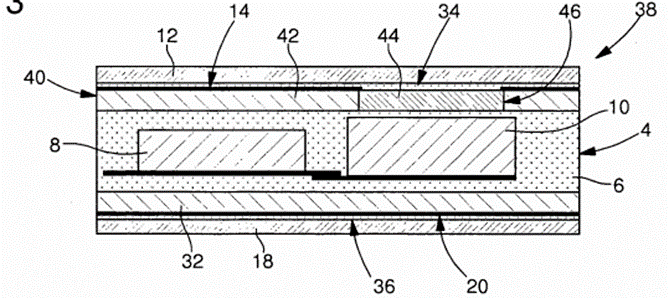The patent relates to a card with a digital display (10) comprising inter alia a “transparent” insert (44) as well as an “opaque” plastic layer (40) recovering the remainder of the card.

The present post is part of a series of three posts dealing with different aspects in opposition.
Brief outline of the case
Both opponents appealed the decision of maintenance in amended form according to a MR. Opponent 2 later withdrew its appeal.
Opponent 1 considered that the MR was not in conformity with R 80.
Opponent 1 also elaborated on the objection raised during the opposition against the amendments to claim 1 and relating to clarity problems.
Opponent 1 also contended that the requirements of Art 83 and 123(2) as well as Art 54 and 56 were not fulfilled.
In reply to the board’s communication under Art 15(1) RPBA20 the proprietor filed a new MR.
Opponent 1 considered that the new MR should not be admitted. They also represented an amendment of the proprietor’s case which is not admissible at a late stage of the appeal procedure.
The board considered that the claims filed in reply to its communication were admissible and allowable.
The board decided remittal to the OD with the order to maintain the patent on the basis of the last MR completed by a description and the figures to be adapted, if necessary.
In the present post we will deal with the alleged non-admissibility of the last MR.
Admissibility of the last MR
The opponent’s objection
Opponent 1 considers that the deletion of claims in the MR (as well as in the AR of 19 May 2022) constitutes an amendment of the proprietor’s case as was recognised in cases T 1569/17 and T 494/18. This amendment justifies that such requests are not admitted at this particularly late stage of the appeal proceedings.
The board’s position
The board noted that the deletion of claims is, in general, viewed more favourably by the boards than suggested by opponent 1, provided that the deletions made do not affect the legal and factual framework of the appeal, cf. T 1857/19. This principle is also recalled in decision T 494/18.
The decisions finding such requests inadmissible concern cases where the deletion of claims was not prima facie likely to affect previous findings, e.g. T 1569/17, or led to the need to discuss new aspects, e.g. T 482/18, T 2222/15, thus going beyond the original legal and factual framework.
Although the board acknowledged in the present case that the deletion of claims constitutes an “amendment” within the meaning of Arts 12(4), 13(1) and 13(2) RPBA20, it considers that this qualification is not decisive in the present case.
Apart from the fact that this notion of “amendment” only partially overlaps with the terminology used in Article 123 and lacks precision, the board considered that what matters above all is to establish whether the deletion of claims serves the economy of the procedure and clearly resolves existing objections without raising new ones.
In the present case, and irrespective of other possible exceptional circumstances, the simplification brought about by the deletion of the claims likely to infringe the provisions of Art 123(2) also constitutes, in any event, exceptional circumstances within the meaning of Art 13(2) RPBA20 which justify the new MR being declared admissible.
In the present case, the board noted that the new MR differs from the previous request 1A, which was still under discussion at the end of the first day of OP, in that dependent claim 10 has been abandoned.
Claim 10 had been the subject of a last-minute objection under Art 123(2) by Opponent 1 on the first day of OP. The parties were given the opportunity to express their views on the admissibility of this objection, which was identical to the one raised against claim 6 of the MR then pending. However, the board did not rule on the admissibility of this objection.
The board found that the circumstances which led the proprietor to withdraw claim 10 constitute exceptional circumstances within the meaning of Art 13(2) RPBA20 insofar as the proprietor could not have expected that Opponent 1 would raise a new objection against claim 10.
The board further noted that the deletion of this claim serves procedural economy since it is no longer for the board to decide on the admissibility and, if applicable, the merits of the late objection.
For the board, the new MR did not give raise to any new issues, but leads, on the contrary, to a simplification of the procedure, as one of the issues to be decided is now obsolete. It is thus admissible under Art 13(1) RPBA20.
Comments
For an opponent, late-filed requests are always welcome as they can, in lots of cases, end up not being admitted. It is, to my knowledge, the first case in which an opponent argued that sets of claims in which claims have been deleted should not be admitted.
This decision makes once more clear that sets of claims in which some claims have been deleted, although they can be considered as an amendment to the proprietor’s appeal case, are nevertheless admissible if they help procedural economy.
This is especially the case when it removes work from the board. Even if objections and the reply thereto are filed after the summons to OP, if the board does not have to decide on admissibility or merit of objections, and the reply does not give raise to new objections, the admissibility is should be acknowledged.
Such a pragmatic approach in appeal is to be encouraged.
It could also apply mutatis mutandis to the grouping of claims in appeal as well as in opposition.
https://www.epo.org/law-practice/case-law-appeals/recent/t170273fu1.html
Comments
Leave a comment